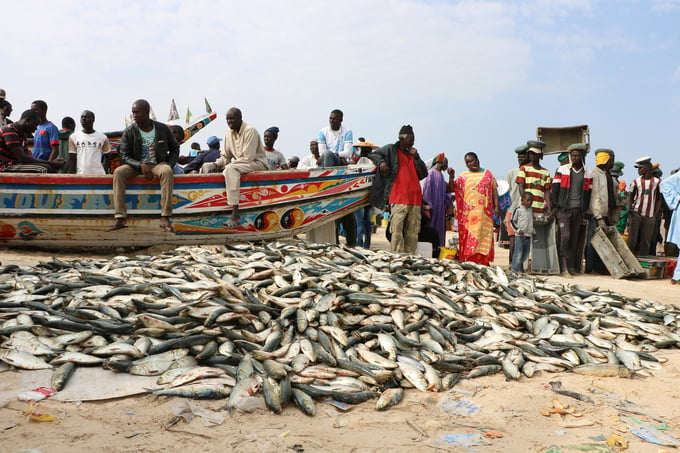November 25, 2025 | 16:10 GMT +7
November 25, 2025 | 16:10 GMT +7
Hotline: 0913.378.918
November 25, 2025 | 16:10 GMT +7
Hotline: 0913.378.918
This action is a part of the EU’s global commitment to combat IUU fishing and is a response to several years of significant deficiencies and a need for more cooperation from Senegal.
The Commission’s decision relies on the grave shortcomings observed over the past few years in Senegal’s compliance system with its international obligations as a flag, port, coastal, or market State.
Deficiencies in Senegal’s monitoring, control, and surveillance systems have been identified in vessels flying the Senegalese flag and operating in waters outside the country’s jurisdiction and in the controls carried out on foreign fishing vessels at the Dakar port.

Overfishing, pollution and climate change are putting increasing pressure on Senegal's rich fisheries. Photo: Sipanews.
Additionally, illegal exports from Senegal to the EU market have been detected, undermining the reliability of the traceability system on which the certification of the legality of fisheries products relies. Lastly, Senegal has not demonstrated sufficient willingness to cooperate with the Commission in fighting IUU fishing.
The Commission has a zero-tolerance approach towards IUU fishing, one of the most severe threats to the sustainable exploitation of living aquatic resources.
IUU fishing jeopardises global efforts to promote better ocean governance and the EU’s Common Fisheries Policy. It also poses a significant hazard to the marine environment, the sustainability of fish stocks, and marine biodiversity. The fight against IUU fishing is an essential aspect of the European Green Deal, the EU’s biodiversity strategy, and the United Nations Sustainable Development Goal for the conservation and sustainable use of the ocean, seas, and marine resources.
“The European Commission is strongly committed to sustainable fisheries and efficient ocean governance. We have zero tolerance for IUU fishing and today we are taking action by giving Senegal a yellow card. Senegal plays an important role in fisheries governance in West Africa”, Virginijus Sinkevičius, Commissioner for Environment, Oceans and Fisheries said.
“The Commission acknowledges the recent actions taken by the new government (i.e. publication of the list of fishing licences, and the audit of the fishing fleet) and it is reassured by this. Therefore, we stand ready to cooperate actively with the country in the fight against IUU fishing, and in particular to help the country remedy the situation and address the threats that IUU fishing poses to the sustainability of fish stocks, coastal communities, food security and the livelihoods of fishers who abide by the rules”, Sinkevičius added.
The Commission has initiated a formal dialogue with Senegal, recognising the new Senegalese Government’s commitment to addressing the identified shortcomings and expressing its readiness to assist the country in its fight against IUU fishing.
It is important to note that, at this stage, the decision does not entail any trade-related measures. The issuance of a ‘yellow card’ offers Senegal an opportunity to respond and rectify the situation within a reasonable timeframe.
However, if non-compliance persists, it could lead to the country receiving a ‘red card,’ potentially resulting in sanctions such as a ban on exporting fishery products to the EU market.
According to FAO, Senegal's long coastline makes fishing an important employer and economic engine for its 15 million population. Fishing contributes over three percent to national GDP and generates around 53 000 direct jobs and over half a million jobs indirectly, mainly in artisanal fishing and processing. Senegal is also a key fish exporter, exporting USD 353 million in fish and fishery products in 2015.
Fish and seafood are also part of the West African nation's diet, representing 43 percent of the country's animal protein intake, with the average person in Senegal eating around 24 kg of fish a year.
However, overfishing, pollution and climate change are putting increasing pressure on its rich fisheries, especially coastal fisheries that account for 80 percent of the total capture, 60 percent of supply for exports and over 108,000 jobs and livelihoods.
Translated by Hong Tham

(VAN) Brazil's COP30 presidency pushed through a compromise climate deal on Saturday that would boost finance for poor nations coping with global warming but that omitted any mention of the fossil fuels driving it.

(VAN) Poultry farmers in the UK have been warned that they could face one of the worst winters yet for bird flu.

(VAN) Prices of main-crop paddy have risen sharply, with jasmine rice hitting 16,100 baht per tonne — the highest level in years.

(VAN) In Brazil, FAO unveiled a series of reports and initiatives showing how sustainable agrifood systems are a solution to the climate crisis.

(VAN) With names like neodymium and dysprosium, rare-earth elements sound exotic — and their perceived scarcity has only added to the mystique.

(VAN) In a new study published in Trends in Biotechnology, researchers used a gene-editing technology called CRISPR to increase a fungus's production efficiency and cut its production-related environmental impact by as much as 61%- all without adding any foreign DNA.

(VAN) A top official in Beijing’s Cop delegation says China is committed to clean energy – but US’s absence is a problem.